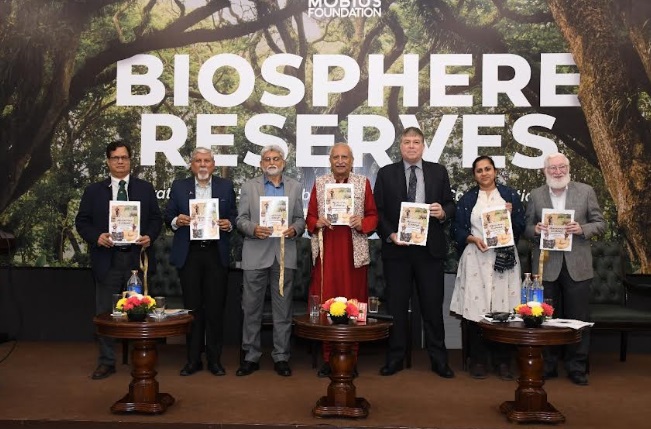Mobius Foundation organised a panel discussion on ‘Biosphere Reserves: Strategies for Sustainable Development and Conservation’ at the Constitution Club of India. The event brought together experts, policymakers, and conservationists from UNESCO, WWF, and various academic institutions to deliberate on the role of biosphere reserves in India’s ecological future. Discussions emphasised Mobius’ vision for safeguarding biodiversity, promoting sustainable livelihoods, and advancing the 2030 Agenda for Sustainable Development.
 |
Release of the Coffee Table Book on Climate Liability, Justice, and Jurisprudence by Mobius Foundation
Mr. Pradip Burman, Chairman, Mobius Foundation addressing the event said, “Biosphere reserves serve as critical pillars of a sustainable future. Collaborative efforts are essential to preserving these declining valuable ecosystems, ensuring that future generations continue to benefit from their ecological and economic contribution.”
The panel featured prominent speakers, including Dr Benno Boer, Chief of Natural Sciences at UNESCO (South Asia Regional Office); Dr Priya Gupta, Lead, Governance, Law & Policy at WWF India; Dr Erach Bharucha, Director of Bharati Vidyapeeth Institute of Environment Education and Research; Dr Aditya Joshi, Former Principal Chief Conservator of Forests, Manipur, and Advisor at Mobius Foundation;and Mr Praveen Garg, President of Mobius Foundation.The discussion was moderated by Mr. Abhilash Khandekar, Senior Journalist.
The panellists pointed out how insufficient community engagement and inadequate livelihood alternatives often lead to conflicts between conservation goals and local needs. Threats from unregulated development, invasive species, and large-scale projects pose significant risks to the ecological integrity of these reserves. Further, funding and an unequal distribution of benefits hinder effective management and sustainable development initiatives. Inadequate research and monitoring infrastructure hinder effective conservation planning.
The discussion explored major opportunities under the themes of biodiversity conservation, habitat restoration, strengthening governance and policy frameworks, sustainable livelihoods and integrating indigenous knowledge into conservation efforts. Dr Benno Boer, Chief of Natural Sciences at UNESCO (South Asia Regional Office) stressed the importance of robust governance mechanisms and collaborative approaches among stakeholders and said, “Biosphere reserves are living laboratories where we can apply, test, and demonstrate best practices for human living in harmony with nature. Active community participation in planning, management, and zonation is crucial to their success.”
Dr Erach Bharucha, Director of Bharati Vidyapeeth Institute of Environment Education and Research emphasised the need for long-term planning and said, “Without dedicated legal frameworks for biosphere reserves, conservation efforts remain fragmented. Strengthening governance and scientific research along with greater financial investment, policy support, and cross-sectoral collaboration is crucial for sustainable development.”
Dr Priya Gupta, Lead, Governance, Law & Policy at WWF India said, “Conservation should be approached with a local perspective, as it has a global impact. Biosphere reserves are biocultural reserves, where cultural systems play a crucial role in the survival of biodiversity.”
Dr. Aditya Joshi, Advisor of Mobius Foundation shared some case studies of different biosphere reserves where the interventions address the main challenges. He stated “Biosphere reserves are the cultural and biodiversity hotspots and through diverse approaches, integration of multi-stakeholder groups and successful models can lead towards balancing conservation with sustainable development.”
Recognizing the critical role of biosphere reserves in achieving the Sustainable Development Goals (SDGs) and the Global Biodiversity Framework, several key recommendations emerge. Strengthening community engagement by prioritizing participatory approaches and providing alternative livelihoods is crucial. Investing in robust research and monitoring infrastructure is essential for effective conservation planning and management. Promoting sustainable practices like organic agriculture, ecotourism, and renewable energy within biosphere reserves is vital. Exploring innovative funding mechanisms, such as carbon credits and biodiversity offsets, is necessary to support long-term conservation efforts. Fostering collaboration among government agencies, local communities, researchers, and the private sector is crucial for effective and integrated management.
Mr Praveen Garg, President of Mobius Foundation, concluded, “Biosphere reserves represent a unique opportunity to protect our natural heritage while promoting sustainable development. Today’s discussion highlights the path forward: collaboration, education, and integrated governance with multi-stakeholder groups. We must act now to safeguard these vital ecosystems for future generations.”
About Mobius Foundation
Mobius Foundation is committed to advancing sustainable environmental practices, biodiversity conservation, and climate justice. Through events, research, and partnerships, the foundation aims to foster collaborative efforts to address global environmental challenges and promote sustainable development worldwide.
![]()


